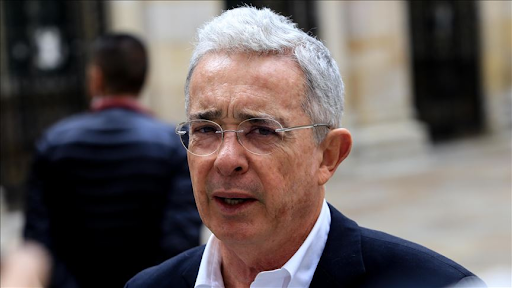A Shocking Turn in Colombia’s Political Landscape
In a harrowing incident that shook the nation, Colombian presidential candidate and former president Álvaro Uribe Vélez narrowly survived an assassination attempt in Bogotá on June 7, 2025. The targeted attack occurred just weeks before Colombia’s presidential elections, escalating political tensions and drawing international condemnation.
Uribe, a central figure in Colombian politics for over two decades, was reportedly shot at while exiting a private meeting in the upscale Chapinero district. According to eyewitness reports and official statements, multiple gunshots were fired, prompting immediate security response. Uribe sustained non-life-threatening injuries and was swiftly transported to a secure medical facility where he is now in stable condition.
Miguel Uribe is transported in an ambulance after being shot.Copyright © BDCNnews. All Rights Reserved.Security Breakdown and Immediate Aftermath
The assassination attempt raises significant concerns regarding the state’s capacity to secure high-profile political figures during a volatile election cycle. The National Police and the Fiscalía General de la Nación have launched a high-level investigation into the incident. Authorities have yet to confirm the identity or motive of the assailant(s), but early speculation points toward organized armed groups possibly aiming to disrupt the electoral process.
Interior Minister María Fernanda Cabal confirmed the deployment of additional security forces in major cities and around key political figures. “We will not allow democracy to be threatened by violence,” she stated during a press briefing.
Historical Context: Uribe’s Polarizing Legacy
Álvaro Uribe, who served as Colombia’s president from 2002 to 2010, remains a deeply polarizing figure. Lauded by some for his hardline stance against guerrilla groups such as the FARC, Uribe also faces criticism for human rights abuses under his administration, particularly the "false positives" scandal involving extrajudicial killings.
As a presidential candidate in 2025, Uribe was staging a controversial comeback, promising to restore security and dismantle narco-terrorist networks. His populist rhetoric and conservative platform resonated with rural voters but drew ire from human rights organizations and progressive coalitions.
Reactions from the Global and Domestic Community
The attempt on Uribe’s life has provoked swift and vocal reactions both domestically and abroad. President Gustavo Petro condemned the attack, calling it “an affront to the democratic values of the republic.” Opposition leaders, despite ideological differences, expressed solidarity with Uribe and urged for a peaceful electoral process.
The United Nations, Organization of American States (OAS), and the U.S. State Department have all issued statements denouncing the violence and urging a transparent investigation.
People hold candles during a vigil outside the Santa Fe hospital where Miguel Uribe is being treated.Copyright © BDCNnews. All Rights Reserved.Election Integrity in Jeopardy
Colombia’s electoral commission is under immense pressure to safeguard the integrity of the upcoming elections. Civil society groups are urging for independent monitoring and more comprehensive protection protocols for all candidates. The incident has intensified calls for electoral reforms, especially in digital surveillance, voter protection, and neutral security oversight.
According to a recent Gallup poll conducted days before the attack, Uribe was trailing slightly behind progressive challenger Claudia López, though still commanding a strong base among older and rural voters.
Violence in Politics: A Recurring Threat
This latest assassination attempt is a grim reminder of Colombia’s troubled political history, marked by decades of conflict involving guerrilla groups, paramilitaries, and drug cartels. Political violence remains an entrenched threat despite the 2016 peace agreement with FARC.
National Security at a Crossroads
The attack has galvanized debates on national security policy. Military analysts warn that failure to protect key democratic institutions and figures could embolden extremist actors. Meanwhile, calls for intelligence reform, police accountability, and cybersecurity enhancement are gaining momentum.
Political analyst Ana María Ibáñez commented, “This event is a stress test for Colombia’s democratic resilience. The way the state responds will define the trajectory of the nation for years.”
The Road Ahead for Uribe and His Campaign
Despite the traumatic event, Uribe has indicated his intention to continue his campaign, citing a duty to his supporters and the country. His first public statement from the hospital was characteristically defiant: “They will not silence us. Colombia’s future belongs to its people, not to the gun.”
Uribe’s team announced increased campaign security and a revised schedule that includes fewer in-person appearances and a stronger emphasis on digital outreach.




